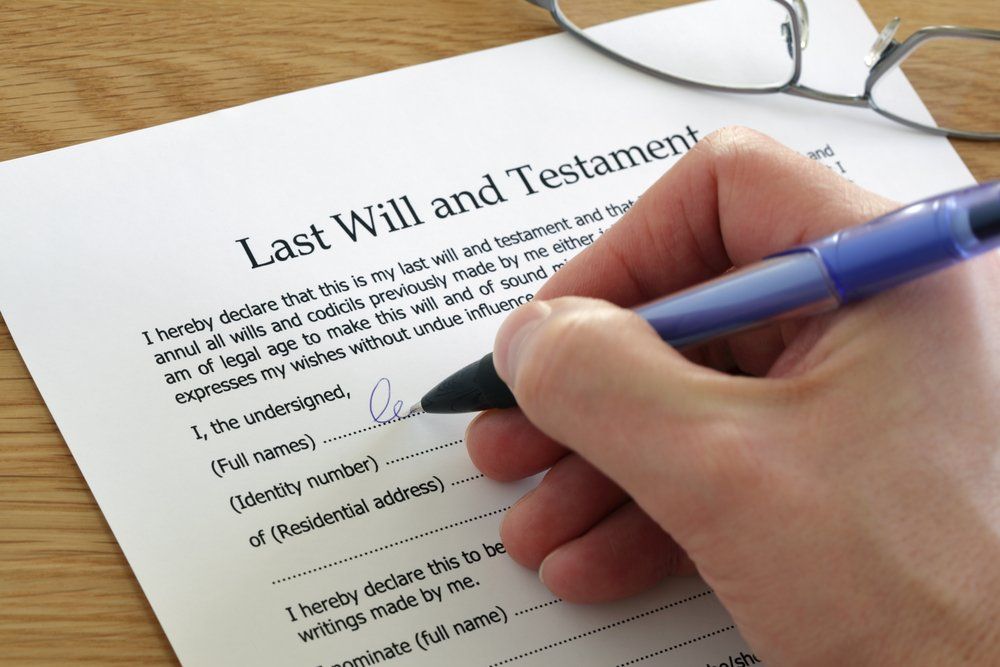Legacy Giving
When considering gifts to a charity in your Will or Trust please remember the Catholic Parishes of the Blue Hills. Gifts can be made to the parish in the following manner through your Will or Trust:
- A specific dollar amount.
- A percentage of your estate.
- A particular asset such as real estate or other valuables.
You may also name the parish as a beneficiary of a retirement plan or life insurance policy.
Establishing an Estate Plan
Everyone should have an estate plan comprising of either a will or a trust. A will is a legal document that allows you to control how your assets are distributed after your lifetime. Without a will, the probate court will decide who gets your assets upon your death. Typically, the court will split your assets between your surviving spouse and children, or your blood relatives. A trust allows you to control how your assets are distributed both during and after your lifetime. Establishing a trust requires that you transfer ownership or title of your assets to the name of your trust. Since the trust owns the assets, there is nothing for the courts to control when you die. This is beneficial since, unlike a will, you avoid all the costs, delays and publicity of the probate process. However, depending on its complexity, a trust can be more expensive to create than a will.
For detailed questions on wills or trusts, contact an estate-planning attorney. If you are planning on giving to a charity, please consider the Catholic Parishes of the Blue Hills as part of your estate plan.
Do You Know the Importance of Estate Planning Documents?
Everyone should have an estate plan. If a person has not documented his wishes, the state will dictate how and to whom that person’s assets are distributed. The state does not provide for any charitable intent in its distribution scheme.
Here are questions to promote your thinking about preparing estate planning documents:
- Have you provided appropriately for your spouse and children?
- Have you remembered your favorite charities in your estate plan?
- Do you know what implications property ownership has on who inherits your assets at death?
- Do you realize the effects of your beneficiary designations on insurance policies and retirement plans?
- How much will you or your heirs pay in taxes upon your death?
- Do you want some of your assets that would go to pay taxes to instead pass to charity?
- Will probate complicate the lives of your family?
- Who will manage your money or make end of life decisions if you are incapacitated?
Have You Considered Your Parish?
There once was a man, who, as he grew older, became more and more upset about the reality that when he died he would have to leave behind everything for which he had worked. Every night he prayed to God to please let him take something that he had acquired into heaven with him. Finally, one night the Lord appeared to the man and told him that since he had been so persistent in his prayers that God would leave a note with St. Peter giving this man permission to bring one suitcase into heaven.
The next morning the man immediately began the process of turning all his assets into gold bars, which he stored in a suitcase under his bed.
Shortly after, when the man died, he appeared before St. Peter dragging his suitcase full of gold bars. Peter checked his records and then asked the man to open the suitcase so St. Peter could check to see what the man was bringing through the Pearly Gates. When the man opened the suitcase, St. Peter just shook his head in wonder. “You beg God for permission to bring something to heaven with you and then you bring PAVING STONES?!!”
Leaving a Legacy
A young man was surprised to find his sick and elderly grandfather planting a small peach tree in his backyard. When the young man asked his grandfather why he was planting the tree, the old man replied, “Son, all my life I have eaten the fruit from trees that other people have planted. I figure I have an obligation to make sure there is some fruit around for others to enjoy.”
Four Ways to Leave a Legacy
Did you know there are four easy ways for you to remember your parish in your will?
- A Specific Bequest – You can designate a certain amount of cash or specific assets to the parish.
- A Residual Bequest – You can plan for the parish to receive all or a portion of your estate after other specific bequests have been distributed.
- A Percentage Bequest – You can designate a certain percentage of the estate to go to the parish.
- A Contingent Bequest – You can make the parish the recipient of a bequest if others named in your will are not living at the time of your death.
No matter how you decide to remember your parish, a gift from your will accomplishes several key benefits.
- It sends a strong message to your heirs that the Church played an important role in your life.
- It guarantees that your generosity to the Church will be continued even after you are gone.
- It provides important assistance to our parish.
- It may even provide tax benefits for your heirs.
Talk to your lawyer or financial counselor today about the best way for you to remember your parish in your will.

